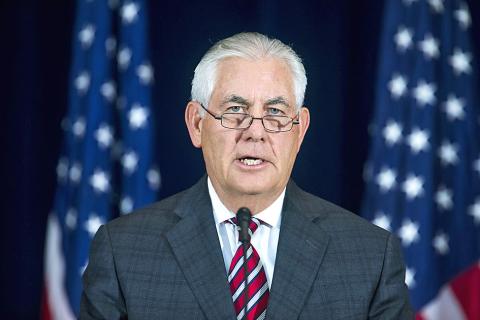US Secretary of State Rex Tillerson on Wednesday urged Chinese officials to apply greater diplomatic and economic pressure on North Korea to force it to rein in its nuclear weapons program.
Tillerson’s remarks came after he and US Secretary of Defense James Mattis met with the Chinese visitors at the US Department of State, where the former general said he saw scope for a better defense relationship.
The extent to which Beijing can influence Pyongyang is key in trying to defuse the North Korean crisis, and Tillerson’s remarks came the day after US President Donald Trump appeared to suggest Chinese President Xi Jinping (習近平) had come up short in efforts to lean on North Korean leder Kim Jong-un’s regime.

Photo: EPA
Calling North Korea the “top security threat” to the US, Tillerson said China has a “diplomatic responsibility to exert much greater economic and diplomatic pressure on the regime if they want to prevent further escalation.”
For their part, the Chinese envoys voiced their opposition to Washington’s deployment of the Terminal High Altitude Area Defense anti-missile defense system in South Korea and demanded its withdrawal, the Chinese Ministry of Foreign Affairs said in a statement.
Trump, who frequently denounced China on the campaign trail, has turned to Beijing to help pressure its ally North Korea, prompting concern among Asian partners that the US might go easy on disputes in the South China Sea, where Taiwan also has claims.
However, on Tuesday, Trump sent a tweet suggesting Xi’s efforts had not borne fruit — a message he reiterated before supporters in Iowa.
“I do like President Xi,” he told the crowd on Wednesday evening. “I wish we would have a little more help with respect to North Korea, from China. That doesn’t seem to be working.”
Tillerson said the US and Chinese officials had agreed that companies from both nations should not do business with any UN-designated North Korean entities.
Trump has made halting the North Korean nuclear threat his No. 1 foreign policy priority.
On Wednesday, the US president took the formal step of extending for another year a national emergency with respect to North Korea that was first decreed in 2008 under then-US president George W. Bush.
In a letter notifying the US Congress of the move, Trump wrote that the “existence and risk of proliferation of weapons-usable fissile material on the Korean Peninsula” together with the “provocative, destabilizing, and repressive actions” of the Pyongyang regime “continue to constitute an unusual and extraordinary threat to the national security, foreign policy, and economy of the United States.”
Last month, Beijing and Washington signed a limited deal to open new markets for each other’s exports, and a long-standing friend of the Chinese leadership, Iowa Governor Terry Branstad, was confirmed as US ambassador.
However, tensions remain — particularly over China’s building of artificial islands in the South China Sea.
“Secretary Mattis and I were clear that the US position remains unchanged,” Tillerson said.
The Chinese side defended Beijing’s “right to take measures to safeguard its territorial sovereignty” and said Washington should respect its security interests.

The US government has signed defense cooperation agreements with Japan and the Philippines to boost the deterrence capabilities of countries in the first island chain, a report by the National Security Bureau (NSB) showed. The main countries on the first island chain include the two nations and Taiwan. The bureau is to present the report at a meeting of the legislature’s Foreign Affairs and National Defense Committee tomorrow. The US military has deployed Typhon missile systems to Japan’s Yamaguchi Prefecture and Zambales province in the Philippines during their joint military exercises. It has also installed NMESIS anti-ship systems in Japan’s Okinawa

‘WIN-WIN’: The Philippines, and central and eastern European countries are important potential drone cooperation partners, Minister of Foreign Affairs Lin Chia-lung said Minister of Foreign Affairs Lin Chia-lung (林佳龍) in an interview published yesterday confirmed that there are joint ventures between Taiwan and Poland in the drone industry. Lin made the remark in an exclusive interview with the Chinese-language Liberty Times (the Taipei Times’ sister paper). The government-backed Taiwan Excellence Drone International Business Opportunities Alliance and the Polish Chamber of Unmanned Systems on Wednesday last week signed a memorandum of understanding in Poland to develop a “non-China” supply chain for drones and work together on key technologies. Asked if Taiwan prioritized Poland among central and eastern European countries in drone collaboration, Lin

Renewed border fighting between Thailand and Cambodia showed no signs of abating yesterday, leaving hundreds of thousands of displaced people in both countries living in strained conditions as more flooded into temporary shelters. Reporters on the Thai side of the border heard sounds of outgoing, indirect fire yesterday. About 400,000 people have been evacuated from affected areas in Thailand and about 700 schools closed while fighting was ongoing in four border provinces, said Thai Rear Admiral Surasant Kongsiri, a spokesman for the military. Cambodia evacuated more than 127,000 villagers and closed hundreds of schools, the Thai Ministry of Defense said. Thailand’s military announced that

CABINET APPROVAL: People seeking assisted reproduction must be assessed to determine whether they would be adequate parents, the planned changes say Proposed amendments to the Assisted Reproduction Act (人工生殖法) advanced yesterday by the Executive Yuan would grant married lesbian couples and single women access to legal assisted reproductive services. The proposed revisions are “based on the fundamental principle of respecting women’s reproductive autonomy,” Cabinet spokesperson Michelle Lee (李慧芝) quoted Vice Premier Cheng Li-chiun (鄭麗君), who presided over a Cabinet meeting earlier yesterday, as saying at the briefing. The draft amendment would be submitted to the legislature for review. The Ministry of Health and Welfare, which proposed the amendments, said that experts on children’s rights, gender equality, law and medicine attended cross-disciplinary meetings, adding that